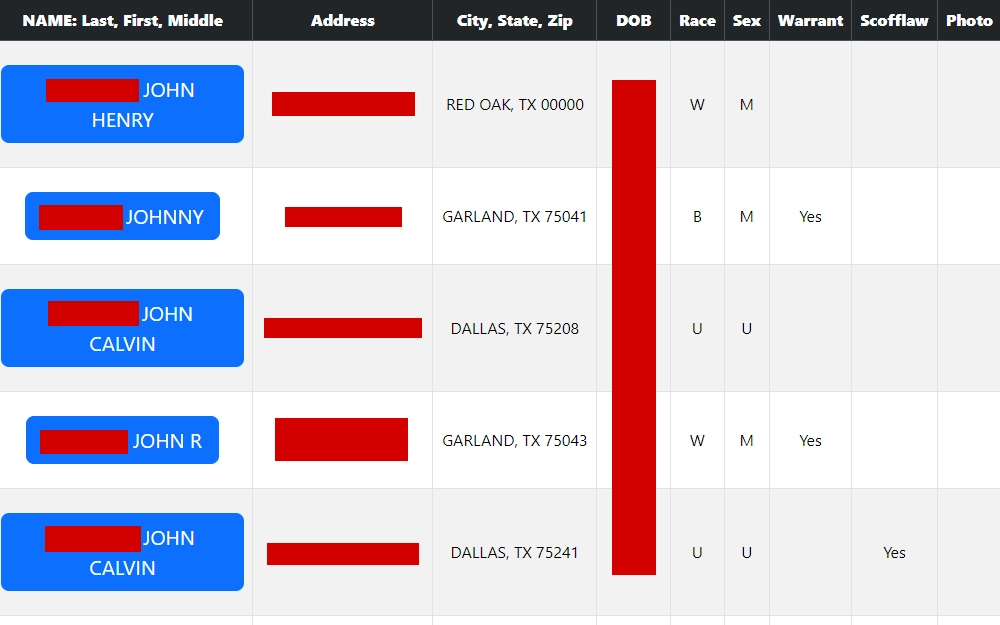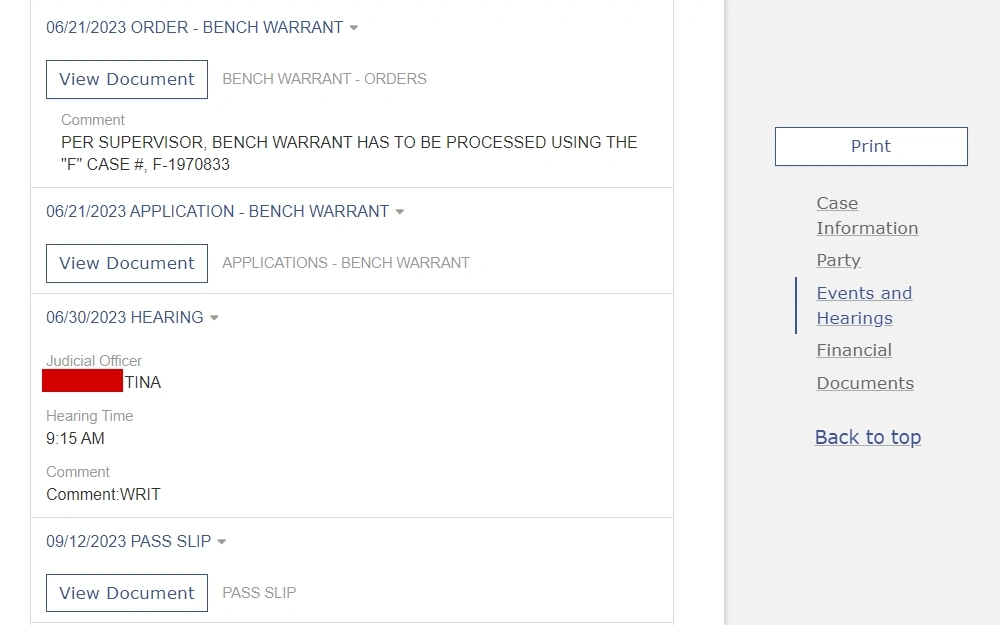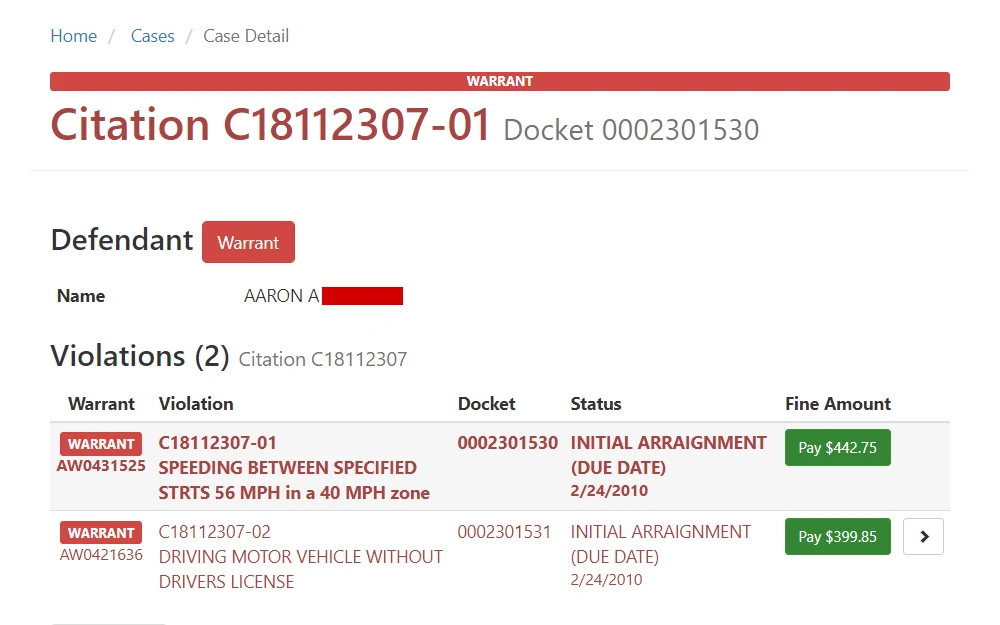Perform a free Dallas warrant search today using the multiple lookup options available.
Conducting a warrant search can allow you to find out if you or someone you know is wanted by law enforcement. You can also look up past warrant information and the crimes or circumstances surrounding them.
Many records produced by government agencies are considered public and are available for inspection and copying through Texas’ Public Information Act, including warrant details — as long as disclosing this information won’t obstruct an ongoing investigation.
There are no requirements for how government agencies need to make this information available, so knowing the most effective search methods is beneficial. Rest assured that this resource details where warrant records are held, how to find these details online, and even how to resolve your own warrant if one is issued for you in Dallas, Texas.
This resource was written by Attorney Robert Bailey Jr, who holds a Juris Doctorate from Widener University School of Law.
Performing a Dallas Warrant Search (The Rundown)
If you are interested in conducting a warrant search, it’s good practice to make yourself knowledgeable about how warrant information is made available, what you need to find this data and who the record custodians are. This information will prepare you and ensure you find the information you seek efficiently.
The general rule under Texas’ Public Information Act is that warrant information is available for a citizen to view and make copies of.1 However, certain confidential information is restricted (e.g., information on juveniles, child abuse investigations and personally identifiable information).
A major exception for warrant information is if the release of the information would impact either a law enforcement investigation or prosecution. This is often the case with search warrants, although less likely to be needed if a warrant is issued for a person’s arrest.
In Dallas County, there are several types of warrants used by law enforcement and the judicial branch. In a later section, these types of warrants will be discussed in detail. If warrant information is publicly available, you can find this information through online databases, searching in person or by submitting a request (e.g., email, mail, phone) with the appropriate record custodian.
If you are planning to conduct a warrant search in Dallas County, make sure you are prepared with the necessary information.
Whether it’s an online database or a form that you need to fill out, you will want to have the full name of the person you want to search and the county where they live (having the complete address is even better). To make sure you are looking for the right government agency, you will also want to confirm you know the county where the warrant was issued.
From there, you should be able to locate most warrants. If you do not have all of this information, it will be helpful to have additional data on the person, such as their physical characteristics. A government agency also may be able to track down a difficult warrant search if you have the date and reason why it was issued.
In Dallas County, there are two primary custodians for warrant information. You can conduct a warrant search directly with the Dallas County Sheriff’s Office. Alternatively, you can look up warrant data by searching criminal cases with the Dallas County Clerk.2
In addition, there are also options at the municipal level in certain larger cities to look up Dallas County warrant information. In the next section, you will learn how to conduct warrant searches with multiple government agencies.
How To Verify if You or Someone Else Has an Active Warrant in Dallas County Texas
If you want to verify that you or someone else has an arrest warrant in Dallas County, you can conduct an online warrant search with the Sheriff’s Office. There are several different options to conduct an online search with this tool. You can search by name, zip code, case number, license plate and more.
Once you perform your search, the results page will provide you with a list of individuals that match your search criteria. On the results page, you can view the person’s name, address, date of birth, race, and sex. It will also indicate if they have a current warrant for their arrest and whether a mugshot is available.

For additional information, you can click on the offender’s name. The page it takes you to will provide the person’s warrant number, issue date, charge description, case number, offense date and location.
The Dallas County Sheriff’s Office also has a Top 5 Wanted and Top 50 Wanted list you can look through.4, 5 To understand more about wanted individuals in Dallas County, you can view their FAQ page.6

For additional information, you can contact the Dallas County Sheriff’s Office warrant general info line at 214-761-9026 or their Warrants Section at 214-653-2700. If you prefer to talk to someone in person, you can go to the address below:
Dallas County Sheriff’s Office
133 N. Riverfront Blvd. #31
Dallas, Texas 75207
Alternatively, you can also access warrant information by conducting an online criminal case search with the Dallas County Clerk. To begin your search, click on the “Advanced Filtering Options” for the Smart Search. You can first narrow your search with the location drop-down menu to criminal cases in the District Court (felonies) or County Court (misdemeanors).
If you choose, you can further narrow down your results by case status and filing date range. Once you perform your search, the results will provide you with matching individuals with their case number, type, and filing date. You can then click on the case number for the complete online criminal record.
In the “Events and Hearings” section, you can see all events and orders of the court. This section is where you will find out when and why a warrant was issued. In most cases, you can even click the “view document” button to see the actual order that issued the warrant.

For additional questions on accessing warrant information through criminal records, you can contact the Dallas County District Clerk by phone at 214-653-7307 or by going to the address below:
Dallas County Clerk
600 Commerce St., Ste. 103
Dallas, Texas 75202
There are also options at the city level. The largest city in the County is Dallas, and their municipal court allows you to search criminal cases online,8 where you may be able to find warrant information. You can use this tool to conduct a name search with the option to add a person’s date of birth and driver’s license number to further refine the search results.
The results will provide the case number, reason for the charges, date of action and current status of the case. When you click on the complete criminal record, you can look under the “status” section to see any warrant information.

For additional information about warrants, you can contact the Dallas Municipal Court by phone at 214-670-0109 or at the address below:10
Dallas Municipal Court
2014 Main St.
Dallas, Texas 75201
Some states will have government agencies that maintain warrant information from every county. Texas does not have any statewide resources for accessing warrant information. To find warrant information on individuals throughout the state, you will have to search with a specific county or city; see the Texas warrant lookup tutorial for guidance and search tools.
Different Warrant Types & the Reasons They’re Issued
If you are not already aware, it’s important to know that there is more than one kind of warrant in Dallas County. Understanding the different kinds of warrants can reduce confusion and assist you in the search process.
In Dallas County, here are some of the types of warrants you may encounter during your search process:
Arrest Warrant: This type of warrant gives law enforcement the authority to arrest a person. The process starts with law enforcement submitting evidence to the judge. If the judge determines that the evidence establishes probable cause that a person committed a crime, they will issue the warrant.
Bench Warrant: A bench warrant, like one for arrest, gives law enforcement the authority to take a particular person into custody. A bench warrant is issued by a judge if a person is in contempt of court. This occurs when a person does not follow a requirement from the court, most often when someone does not show up for their hearing.
Search Warrant: A search warrant is requested to look in a particular private location for evidence of a specific crime. Similar to arrest warrants, the process begins with law enforcement presenting probable cause that there is likely evidence of a crime located in a particular spot.
Probation or Parole Warrant (Blue Warrant): This type of warrant is issued if a person fails to comply with one of the terms of their parole or probation.
Capias Pro-Fine Warrant: This type of warrant allows for the arrest of an individual for failure to satisfy a judgment with the court.
Child Support Warrant: A warrant can be issued for a parent who is delinquent in their child support payments.
Fugitive Warrant: Issued for a person that has fled the jurisdiction where they committed a crime.
Note: If any of these warrants are listed as active, it simply means they aren’t fully resolved.
How To Settle an Active Warrant in Dallas County TX
After you have performed a search, you may have discovered information relating to an active warrant for either yourself or someone you know. When this occurs, you will want to make sure you take the appropriate action.
If you find out you have an active warrant, talk to a licensed attorney in criminal law. They will be able to inform you as to the seriousness of the warrant and what your next steps are. It may not be as serious as you think, and you may be able to have it quashed if you take appropriate action to resolve the issue.
This may include either the scheduling of a court hearing or paying money due to the court.
If you are required to turn yourself in, the attorney will be able to advise you on your rights. During this time, you will also want to contact a bail bondsman. This will allow you to post bail quicker if the opportunity is available to you.
Before you turn yourself in, also make sure you let any family member know who may be wondering where you are.
If you find an active warrant for someone else, there is some subjectivity as to what you should do with this information. If it’s for a dangerous felony, you should just contact law enforcement, such as the Dallas County Sheriff’s Office.11
If the warrant is not for a dangerous felony, it would be kind to let the person know in case they are unaware. If you do not know them well, you could always just let a family member or mutual friend know.
This article provides you details on warrants, who maintains them and how to perform a Dallas warrant search, and you can refer to it any time to streamline your retrieval of records or to resolve your own warrant; delve deeper into local residents by following the steps for accessing Dallas County mugshots and the instructions for tracking down Dallas arrest details.
References
1Texas Attorney General. (n.d.). Overview of the Public Information Act. Retrieved January 18, 2024, from <https://www.texasattorneygeneral.gov/open-government/members-public/overview-public-information-act>
2Dallas County, Texas. (n.d.). Online Record Search. Retrieved January 18, 2024, from <https://www.dallascounty.org/services/record-search/>
3Dallas County Sheriff’s Office. (n.d.). Dallas County Wanted. Retrieved January 18, 2024, from <https://www.dallascounty.org/dcwantedsearch/searchByName>
4Dallas County Sheriff’s Office. (n.d.). Dallas County Wanted – Top 5 Wanted. Retrieved January 18, 2024, from <https://www.dallascounty.org/dcwantedsearch/>
5Dallas County Sheriff’s Office. (n.d.). Dallas County Wanted – Top 50 Wanted. Retrieved January 18, 2024, from <https://www.dallascounty.org/dcwantedsearch/offendersList.jsp>
6Dallas County Sheriff’s Office. (n.d.). Dallas County Wanted – Frequently Asked Questions. Retrieved January 18, 2024, from <https://www.dallascounty.org/dcwantedsearch/faq.jsp>
7Dallas County, Texas Courts. (n.d.). Details. Retrieved January 18, 2024, from <https://courtsportal.dallascounty.org/DALLASPROD/Home/WorkspaceMode?p=0#OtherEvents>
8Dallas Municipal Court. (n.d.). Traffic/Criminal Case Search. Dallas, TX Record Search. Retrieved January 18, 2024, from <https://www.municipalrecordsearch.com/dallastx/Cases>
9Dallas Municipal Court. (n.d.). Citation C18112307-01. Dallas, TX Record Search. Retrieved January 18, 2024, from <https://www.municipalrecordsearch.com/dallastx/Cases/Detail?referrer=Case&citationNumber=C18112307&violationNumber=01&SearchBy=Name&SearchByNameCriteria.LastName=smith>
10Dallas Municipal Court. (n.d.). Court & Detention Services – Warrant Information. Retrieved January 18, 2024, from <https://dallascityhall.com/departments/courtdetentionservices/Pages/Warrant-Info.aspx>
11Dallas County Sheriff’s Office. (n.d.). Contact Us. Retrieved January 18, 2024, from <https://www.dallascounty.org/departments/sheriff/contact-us/>
